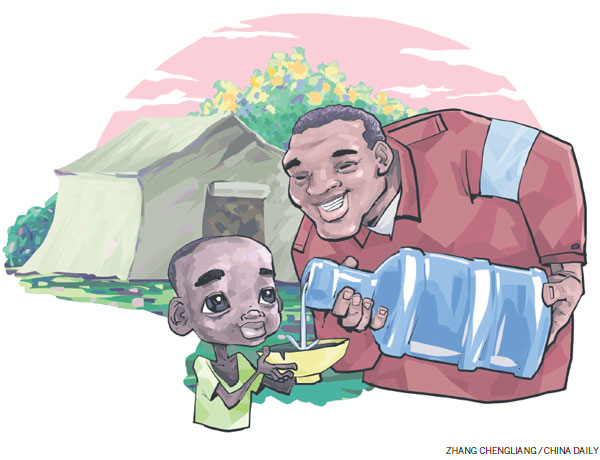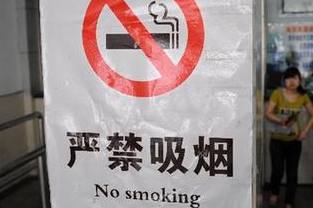Xi's writings offer Nigeria valuable lessons

Let's work together to strengthen cooperation to fight poverty and strive for common prosperity
President Xi Jinping's book Up and Out of Poverty contains interesting chapters and has a lot of development lessons that Nigeria can learn from in transforming its own economy.
China and Nigeria are united in their determination to eliminate poverty. China's success story in poverty reduction is substantially a good development lesson that Nigeria is keen to learn from. Xi's book is a significant window through which the Nigerian government can look into China's development model and learn from it.

"This is the first time a serving leader of China has made his philosophy, his ideas and his programs available to the international community in (so many) languages," David Ferguson, a Scottish writer and translator, recently told China Daily.
Ferguson, a foreign expert with China International Publishing Group, which runs Foreign Languages Press, the book's publisher, added, "An enormous amount of international attention is being paid to China at the moment. There are huge expectations of China. The world wants to know what to expect of China under the current leadership."
Up and Out of Poverty showcases Xi's working period in Ningde, Fujian province, with his contributions, new strategic plans and how he implemented them, leading the people into a new phase of development. The thoughts, ideas and policies laid out in the book in terms of poverty alleviation require a change of attitude and the support of knowledge sharing (education).
Xi addresses the poverty mentality among disadvantaged communities. Development work must begin by addressing the mindset in the communities and the leader's mindset as well. All players must believe that development is possible. Unless the mind is transformed, development will not happen. Impoverished regions cannot have impoverished ideas - finding contentment in poverty, wanting government aid, depending on financial grants, requiring poverty allowances and blaming everyone else.

Xi states that "a weak hatching bird can be the first to fly, and the poorest can be the first to become rich, but we must first have the concept in mind." His book is a good tutorial for development and poverty reduction, especially for developing nations such as Nigeria.
He says that "developing the economy is our political priority" and "equal importance to growing the economy and keeping the government clean" were not only the key to Ningde's success in poverty reduction and development, but were also the epitome of the whole nation's successful experience in reform and opening-up.
At the moment, these thoughts continue to guide China in meeting its poverty eradication targets and are highly relevant for other developing nations like Nigeria in their own poverty alleviation efforts.
The book shows that making headway is not possible without a sound and complete governing mechanism. China's development model offers an example to Nigeria if the latter intends to set out long-term development objectives, including promoting sustainable growth and welfare improvements for the Nigerian people, as well as a medium-term strategy for operationalizing the country's Vision 20: 2020 development goal.
China has successfully lifted 800 million people out of poverty in the past 35 years and contributed 70 percent to the UN Millennium Development Goals on poverty reduction, which is seen as a miracle in the world's development history. In 1949, when the People's Republic of China was founded, China's GDP was only $18.9 billion (15.6 billion euros; £14.6 billion), while per capita GDP was $35. China was labeled as one of world's poorest countries at that time. In 1978, when China embarked on its reform and opening-up, its GDP and per capita GDP reached $216.8 billion and $227, respectively, while in 2016 it jumped to more than $10 trillion and $8,000, respectively.
Additionally, China's average life expectancy increased from merely 35 years in 1949 to 76.34 years in 2015. The Chinese government is determined to eradicate poverty regardless of the challenges ahead by setting an ambitious new target to lift at least 10 million people out of poverty each year from 2016, lifting a total of 43.35 million rural residents out of poverty by 2020. However, while combating poverty at home, China also actively assists other developing nations, such as African nations, to address their poverty problems.
In his 10 deliverables at the Forum on China-Africa Cooperation Summit in Johannesburg, South Africa, in December 2015, Xi reaffirmed his country's support for poverty alleviation in Africa under the plan for 2016-19. Xi said that to eradicate poverty and boost development in eastern Fujian, he devised innovative ideas, mechanisms and methods that he thinks can also assist African nations, especially Nigeria, in lifting their people out of poverty, and he shares those in the book.
Up and Out of Poverty shows his concern and cares for the people in Ningde and his confidence and determination to fight poverty. The book offers thoughts, ways and a vision to help the country and other developing countries such as Nigeria in fighting poverty. The idea and the summarization of his experience offers a theoretical and political foundation for poverty alleviation.
There is an old Nigerian proverb that says "a man cannot sit down alone to plan for prosperity". Growing economic cooperation with China provides Nigeria with a reason to be optimistic about its plans. Xi has advocated realizing common development and prosperity and building a community of shared future for mankind, injecting fresh impetus into and opening up a new vista for China-Nigeria cooperation, which should be a top priority.
Poverty remains a crucial issue in Nigeria. According to the country's National Bureau of Statistics, 115 million Nigerians live below the poverty level, compared with the more than 40 million Chinese who need to be lifted out of poverty to fulfill China's promise of eliminating poverty by 2020. The common daunting task will hold China and Nigeria together and open new prospects for the increasingly strengthened China-Nigeria strategic partnership. China will step up the sharing of governance experience with Nigeria without any reservation by maintaining a regular high-level exchange of visits and expanding links between governments, political parties and states or provinces, with a view to jointly exploring a pathway out of poverty and toward prosperity as needed by Nigeria. There is no one-size-fits-all method or panacea for erasing poverty. Facing poverty and its collateral challenges, Nigeria cannot mechanically copy, but can flexibly learn from, China's successful experience. However, Nigeria must not aim to be China but to surpass China.
Development is the master key to solving all problems. China will further synergize development strategies sincerely and deepen practical cooperation with Nigeria enormously. Ultimately, whether it is Nigeria's Economic Recovery and Growth Plan (2017-20) or China's 13th Five-Year Plan (2016-20) and supply-side structural reform, all are designed to satisfy the peoples' wish for a better life. In this vein, China-Nigeria practical collaboration in such areas as agriculture, manufacturing, infrastructure, minerals and human resources and knowledge sharing has served and will always serve the primary task of the development of Nigeria.
In order to realize a world in which no one is left behind, successful policies and know-how from developed nations and poverty reduction policies that have lifted 800 million Chinese out of poverty should be shared and made available to developing nations, especially African nations trying to lift their people out of poverty. That is the key to achieving the new continental and globally sustainable development goals: African Agenda 2063 and the United Nations 2030 Agenda for Sustainable Development goals.
We should work together to strengthen coordination and cooperation to fight poverty, strive for common prosperity, and jointly embrace a brighter future. As Nigeria pursues its ambitious plan to become one of the 20 largest economies in the world by 2020, China looks forward to being a steady partner in accelerating efforts to end poverty and boost shared prosperity in Africa's largest, most populous country. This, in turn, will also benefit Nigeria's neighbors across West Africa.
The author is a researcher with the Institute of African Studies at Zhejiang Normal University. The views do not necessarily reflect those of China Daily.
(China Daily Africa Weekly 09/08/2017 page10)
Today's Top News
- China accelerates push for autonomous driving
- Opening of new gateway can help foster global economic and trade cooperation
- The farmer, the snake and Japan's memory hole
- Crossing a milestone in the journey called Sinology
- China-Russia media forum held in Beijing
- Where mobility will drive China and the West






























